« Chronique:Halo Bulletin 11/04/2012 » : différence entre les versions
m Je suis en train de créer la section, si vous voulez faire une remarque adressez-vous à moi sur ma page de "Discussion" ! |
m A protégé « Halo Bulletin /2 »: Projet administratif en cours (blocage temporaire) : Je suis en train de créer la section, si vous voulez faire une remarque adressez-vous à moi sur ma page de "Discussion" ! ([edit=sysop] (expire le 13 juillet 2 |
(Aucune différence)
| |
Version du 6 juillet 2012 à 23:02
Ce Bulletin d'Halo nous propose de faire plus ample connaissance avec Neil Davidge, le compositeur de la musique d'Halo 4. Après une brève introduction, nous en apprendrons plus sur sa vie et ses œuvres. Finalement, Sotaro Tojima nous racontera sa rencontre avec Neil Davidge avant de partager avec nous un échantillon de la musique d'Halo 4.
11 Avril 2012
=Original
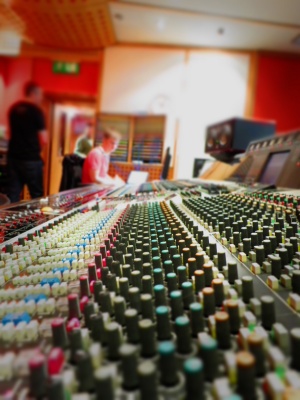
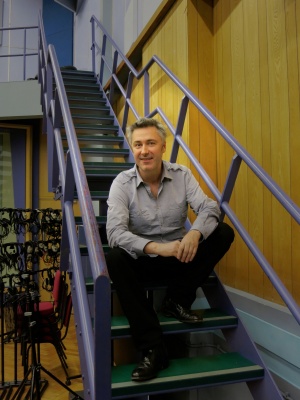
Our mystery composer… revealed !
One of the major contributing factors to a memorable and emotional video game experience is its soundtrack, and that statement rings especially true when exploring Halo’s vast and mysterious sci-fi universe. From the aggressive riff of a guitar to the powerful beat of drums to the liturgical chant of monks, there are numerous sounds that have become etched into the essence of Halo.
Following a tradition that started more than ten years ago, 343 Industries is dedicated to continuing the legacy of weaving iconic music into the very fabric of the Halo experience. It is that goal that led us to the virtual doorstep of an award-winning composer, record producer, songwriter, and musician who has made an indelible impression on the music industry.
That person is Neil Davidge.
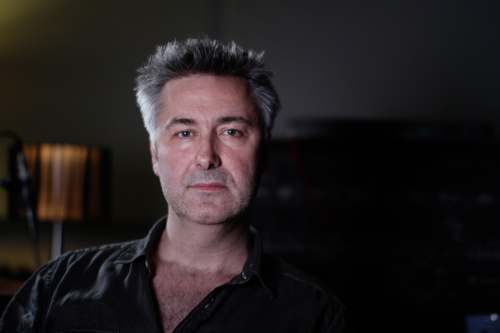
| « | Neil Davidge, Composer for Halo 4
|
» |
As co-writer and producer for the last three albums from pioneering trip-hop group Massive Attack, Neil Davidge not only had a hand in creating some of the most innovative sounds over the past two decades, but he also helped develop an entire genre of contemporary music. He has established a career as a film composer, scoring acclaimed documentaries and composing additional music for Hollywood blockbusters like “Clash of the Titans,” and now his focus is on Halo 4.
Enlisting a 16-person, hand-picked, male tenor/bass choir plus 10 female Bulgarian vocalists, a full 50-piece orchestra, and a whole host of other performers is just one of the things Neil Davidge and his production team has done to bring the music of Halo 4 to life. The following video, which shows a recent choir and orchestral recording session at Abbey Road and Angel Studios in London, gives a behind-the-scenes look at the creation of the haunting and compelling Halo 4 soundtrack.
{{#putyoutube: youtube|BV6LLr2wU_s?hd=1|650}}
Neil Davidge Bio
As co-writer and key sonic facilitator on the lauded Massive Attack albums Mezzanine, 100th Window, and Heligoland, Neil Davidge, of Bristol, England, helped birth some of the most arresting and innovative sounds of the Nineties and Noughties. He has also enjoyed a parallel career composing for prestigious film and TV ventures. To date, feathers in his cap have included “The Storm That Brought You To Me,” from Louis Leterrier’s 2010 fantasy film Clash Of the Titans, and his co-written score for Trouble The Water, a moving study of Hurricane Katrina victims that won the ‘Best Documentary’ gong at the 2008 Sundance Film Festival.
Now, though, as Neil explains, a certain hands-on experience was as vital as his musical credentials when securing the gig:
“I don’t really play a lot of video games, but I’ve always played Halo. I started when I was making 100th Window with Massive Attack; it was how I entertained myself while I was waiting for the band to show up. Even later on if I was in the studio and feeling frustrated, Halo was one of the first things I’d turn to to get my head straight.”
Neil visited our studio prior to starting work on the new music. “I came back to Bristol on a high and immediately starting writing,” says the composer. “I wasn’t even officially engaged yet, but that period generated a number of major themes that we’ve ended up keeping.”
Neil says his soundtrack is a fairly even split between orchestral and electronic elements; this a tailor-made match for him and his co-arranger Andrew Morgan, since both men are well-versed in both fields. The orchestral elements were recorded at Abbey Road, and the electronic ones were hatched at Neil’s mysterious and moniker-less studio complex in “an apartment building somewhere in Bristol.”
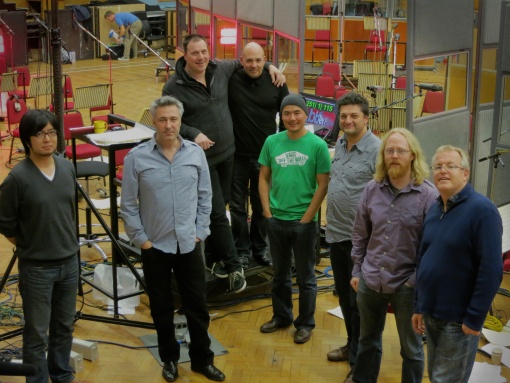
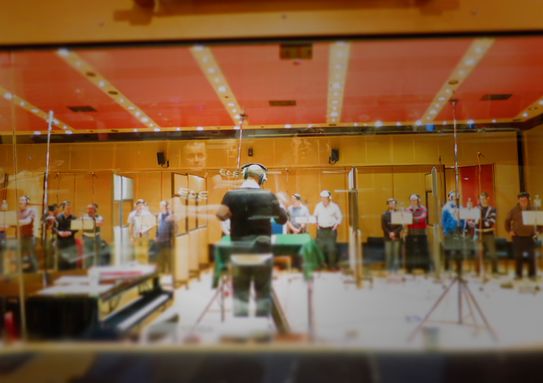
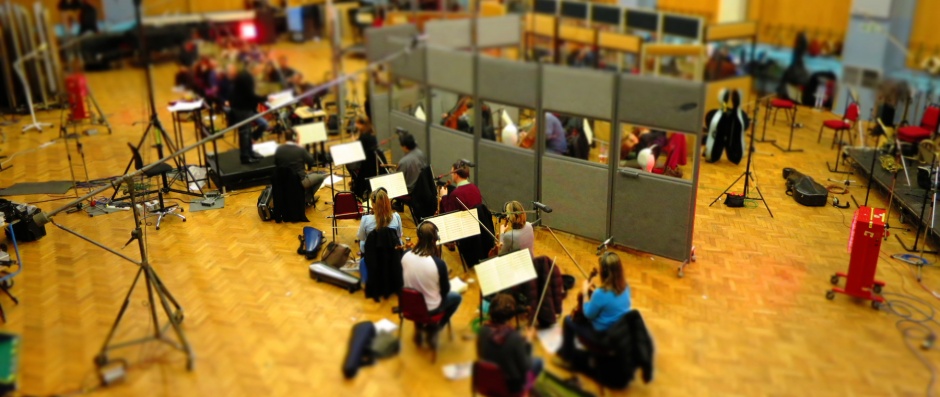
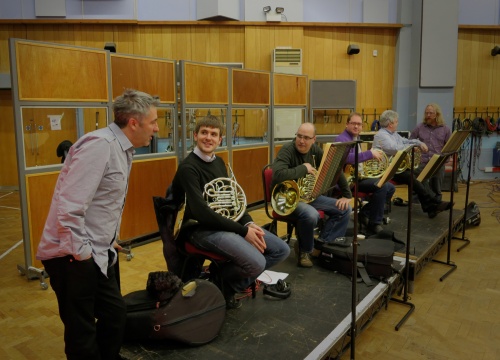
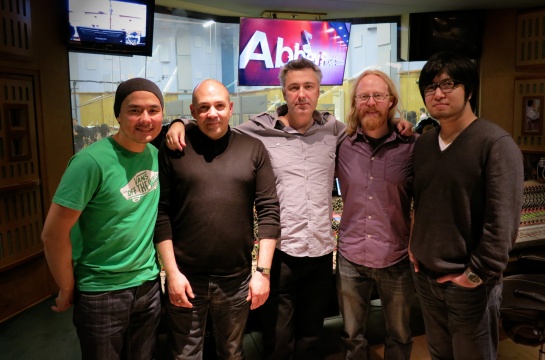
“The music is very cinematic and atmospheric,” he says. “At times it can be textural while at the same time being quite grim—when someone’s running around shooting aliens, you have to know that shit’s going to happen! I was working from artists’ impressions of various scenes rather than video footage. That left things quite open, but as I’m a former graphic designer and graphic novels fan, it fired my imagination as well.”
Neil Davidge was born in Bristol, England, in 1962. As a teenager, he loved to paint, creating both fine-art works and more abstract pieces. Prior to studying graphic design at Brunel Technical College, he was enamored of the late 1970’s UK punk/reggae scene, and he began painting likenesses of the Banshees’ Siouxie Sioux and the dub poet Linton Kwesi Johnson.
Having learned guitar thanks to punk’s DIY ethic, Neil later embarked upon long hours of alchemical, suck-it-and-see experimentation as he learned the complex but rewarding art of sound-recording.
Happily, he was in situ at Bristol’s Coach House Studios when famed trip-hop act Portishead recorded parts of their debut album Dummy there between 1991 and 1994, and in 1996, he hooked up with Massive Attack on “The Hunter,” a song for the Batman Forever soundtrack that featured Everything But The Girl vocalist Tracey Thorn. That same year, Massive Attack won a Brit Award for ‘Best Dance Act,’ thus cementing a working relationship with Neil Davidge that would continue for some 17 years.
It was Massive Attack’s stately, cinematic sound—together with Neil’s longstanding affinity for visual mediums, of course—that lent his scoring for film, TV, and advertising an air of inevitability. After auteur Luc Besson came to Neil and Robert Del Naja of Massive Attack to commission music for his 2005 martial arts thriller Unleashed, a swathe of other attractively varied coups followed. Among them were scores for the films Bullet Boy and Battle In Seattle, advertising campaigns for Jaguar and Adidas, and Neil’s collaboration with Snoop Dogg while scoring music for In Prison My Whole Life, a documentary about US death-row journalist Mumia Abu-Jamal.
“I just have to concentrate on the music and hope that, if it moves me, the fans and the people at 343 Industries will get a similar feeling. If they do, I’ll have done my job.”
Office of Halo Intelligence: Part 7
Office of Halo Intelligence, or OHI for short, is a semi-regular diary-type feature brought to you by various members of the Halo 4 development team. This week, to give you some special insight into Neil Davidge’s Halo 4-related work, I asked Sotaro Tojima, Audio Director for Halo 4, to write an entry that is sure to be music to your ears.
What soundtrack sample, you may be wondering? Why the following one, of course. Press play, close your eyes, and soak in the sounds of Halo 4. {{#putyoutube: youtube|BQ-mmSh9yMw?&hd=1|650}}
Download the Soundtrack Sample Now
And this week’s Bulletin ends on that note. Until next week….
<3, bs angel